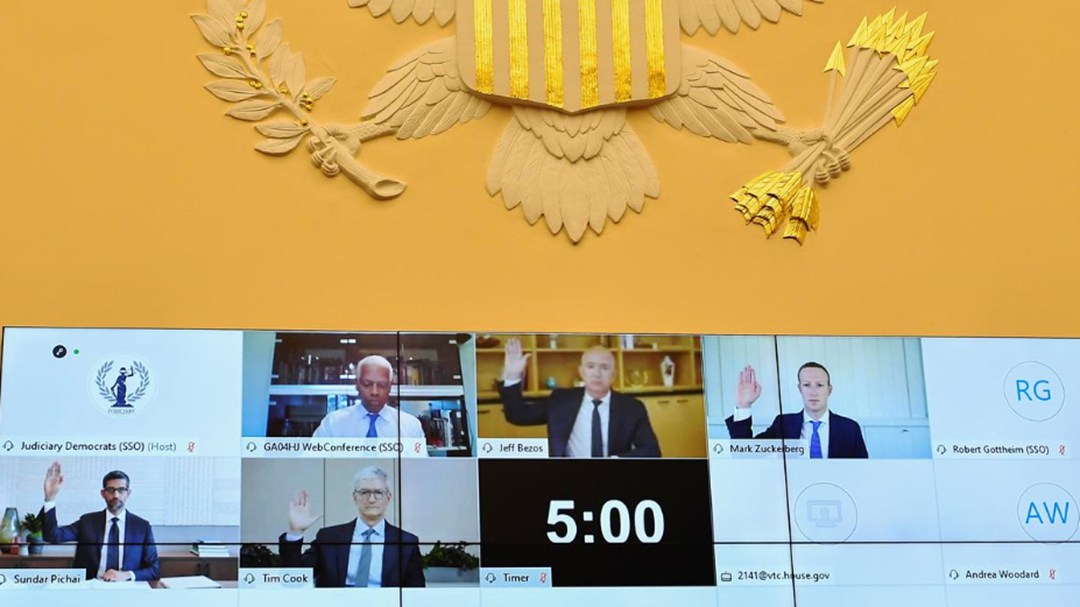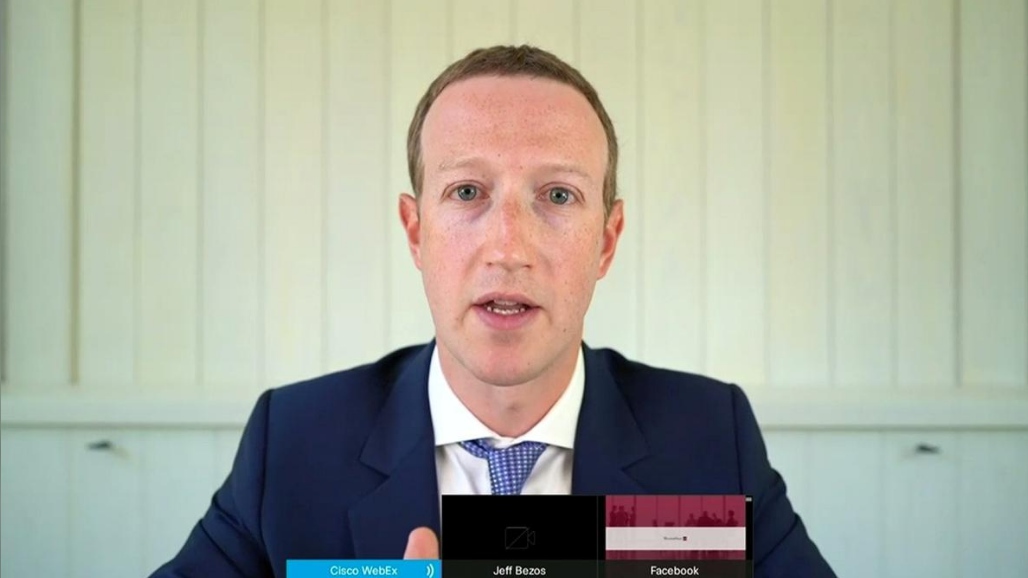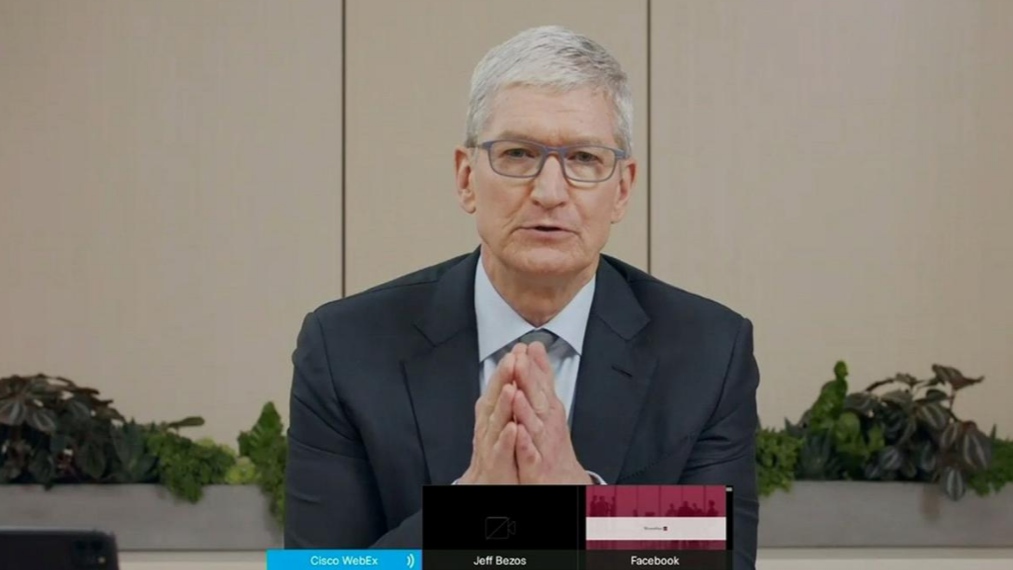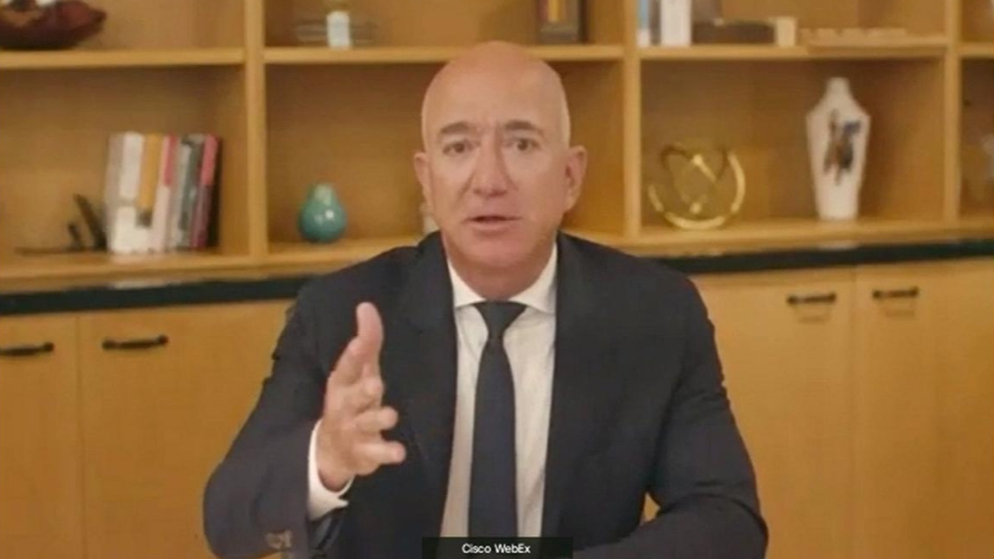
Witnesses Amazon CEO Jeff Bezos, Facebook CEO Mark Zuckerberg, Google CEO Sundar Pichai, and Apple CEO Tim Cook are sworn-in before a hearing of the House Judiciary Subcommittee on Antitrust, Commercial and Administrative Law on "Online Platforms and Market Power", in the Rayburn House office Building on Capitol Hill, in Washington, U.S., July 29, 2020. /Reuters
Witnesses Amazon CEO Jeff Bezos, Facebook CEO Mark Zuckerberg, Google CEO Sundar Pichai, and Apple CEO Tim Cook are sworn-in before a hearing of the House Judiciary Subcommittee on Antitrust, Commercial and Administrative Law on "Online Platforms and Market Power", in the Rayburn House office Building on Capitol Hill, in Washington, U.S., July 29, 2020. /Reuters
Big Tech executives faced an onslaught of criticism from U.S. lawmakers Wednesday at a high-stakes antitrust hearing which could lay the groundwork for tougher regulation and legal actions against the major internet platforms.
CEOs Tim Cook of Apple, Jeff Bezos of Amazon, Mark Zuckerberg of Facebook and Sundar Pichai of Google were grilled for more than five hours in the unprecedented joint appearance -- by video -- before a House of Representatives panel investigating market dominance.
While the hearing was called to focus on whether the companies have abused their dominant positions in the market, it veered quickly into other topics including political bias, privacy, dealings with China and how platforms deal with misinformation.
"Simply put, they have too much power," said Representative David Cicilline, a Democrat from Rhode Island who chairs the panel conducting a year-long investigation into the business practices of the four companies.
Cicilline said the hearing made clear that the firms "have monopoly power -- some need to be broken up, all need to be properly regulated and held accountable."
Congress has no formal role in antitrust enforcement, but several lawmakers appeared intent on revising U.S. laws to deal with the extraordinary market power and dominance of large technology firms.

Facebook CEO Mark Zuckerberg testifies remotely via videoconference during a U.S. House Judiciary Subcommittee on Antitrust, Commercial and Administrative Law hearing on "Online Platforms and Market Power" in this screen grab made from video as the committee meets on Capitol Hill, in Washington, U.S., July 29, 2020. /Reuters
Facebook CEO Mark Zuckerberg testifies remotely via videoconference during a U.S. House Judiciary Subcommittee on Antitrust, Commercial and Administrative Law hearing on "Online Platforms and Market Power" in this screen grab made from video as the committee meets on Capitol Hill, in Washington, U.S., July 29, 2020. /Reuters
Cicilline said the coronavirus outbreak has strengthened the economic clout of the four, saying: "They are likely to emerge (from the pandemic) stronger and more powerful than ever before."
A few comments from lawmakers sought to play down the competitive harms of the companies, which have also won praise for innovating and introducing new technologies and offering lifelines during the virus lockdowns.
"Being big is not inherently bad," said Jim Sensenbrenner, a Republican from Wisconsin. "Quite the opposite, in America you should be rewarded for success.

Google CEO Sundar Pichai testifies remotely via videoconference during a U.S. House Judiciary Subcommittee on Antitrust, Commercial and Administrative Law hearing on "Online Platforms and Market Power" in this screen grab made from video as the committee meets on Capitol Hill, in Washington, U.S., July 29, 2020. /Reuters
Google CEO Sundar Pichai testifies remotely via videoconference during a U.S. House Judiciary Subcommittee on Antitrust, Commercial and Administrative Law hearing on "Online Platforms and Market Power" in this screen grab made from video as the committee meets on Capitol Hill, in Washington, U.S., July 29, 2020. /Reuters
Some lawmakers sought to highlight problems with tech companies operating platforms while competing with rivals on those systems.
Democrat Pramila Jayapal of Washington state question Pichai on how Google operates its ad platform, claiming that this hurts other online services such as news outlets.
Google "is running the marketplace it's acting on the buy side and it's acting on the sell side, which is a major conflict of interest," Jayapal said.
Apple's Cook faced tough questioning over the market power of the company's App Store and its treatment of developers.
"We treat all app developers the same," Cook said. "We do not retaliate or bully people."
Bezos, in his first appearance before a congressional committee, defended Amazon's dealings with third-party sellers after a blistering attack from Cicilline.
"Isn't it true that small businesses have no real option but rely on Amazon to connect with customers to make online sales?" the committee chair asked.
"We've heard from third party sellers again and again during the course of our investigation that Amazon is the only game in town."
Bezos disputed the characterization while adding, "There are a lot of options for small firms ... I think we are the best one."

Apple CEO Tim Cook testifies remotely via videoconference during a U.S. House Judiciary Subcommittee on Antitrust, Commercial and Administrative Law hearing on "Online Platforms and Market Power" in this screen grab made from video as the committee meets on Capitol Hill, in Washington, U.S., July 29, 2020. /Reuters
Apple CEO Tim Cook testifies remotely via videoconference during a U.S. House Judiciary Subcommittee on Antitrust, Commercial and Administrative Law hearing on "Online Platforms and Market Power" in this screen grab made from video as the committee meets on Capitol Hill, in Washington, U.S., July 29, 2020. /Reuters
President Donald Trump, who has accused Facebook and Twitter of censoring his remarks and being biased against conservatives, weighed in with a tweet shortly before the hearing began, and some Republican lawmakers echoed those remarks.
"If Congress doesn't bring fairness to Big Tech, which they should have done years ago, I will do it myself with Executive Orders," Trump said.
Representative Jim Jordan, a Republican from Ohio, said during the hearing: "I'll just cut to the chase -- Big Tech is out to get conservatives. That's not a suspicion. That's not a hunch. That's a fact."
Democrat Jamie Raskin of Maryland rejected the argument, saying Facebook and other platforms have failed to contain misinformation from Trump and his supporters, including unverified COVID-19 claims.
"If Facebook is out there trying to repress conservative speech they're doing a terrible job," Raskin said. "I don't understand this endless whining" from Republicans.

Amazon CEO Jeff Bezos testifies remotely via videoconference during a U.S. House Judiciary Subcommittee on Antitrust, Commercial and Administrative Law hearing on "Online Platforms and Market Power" in this screen grab made from video as the committee meets on Capitol Hill, in Washington, U.S., July 29, 2020. /Reuters
Amazon CEO Jeff Bezos testifies remotely via videoconference during a U.S. House Judiciary Subcommittee on Antitrust, Commercial and Administrative Law hearing on "Online Platforms and Market Power" in this screen grab made from video as the committee meets on Capitol Hill, in Washington, U.S., July 29, 2020. /Reuters
Some analysts said the hearing could set the stage for revising U.S. antitrust laws, which at present make it difficult for enforcers to target companies simply for being large or dominant without also showing harm to consumers or abuse of market power.
"There was considerable skepticism toward the tech sector as legislators worry about unfair competition and unfair practices," said Darrell West, director of the center for technology innovation at the Brookings Institution.
"If Democrats gain control in the (November elections), this hearing will serve as a blueprint for enhanced regulatory oversight," West said.
Michael Carrier, a Rutgers University professor of antitrust law, said that "the hearing showed that the representatives did their homework" and showed documents hinting at anticompetitive actions.
"I don't think any immediate changes will result from the hearing, but it will provide support for the continuing momentum to challenge these companies," he said.
Avery Gardiner, a former government antitrust lawyer who follows competition for the Center for Democracy & Technology, said the hearing was "an opportunity squandered" which failed to demonstrate specific anticompetitive actions, leaving the matter now to regulatory agencies.
"Congressional hearings, which by their nature are broad-ranging, do not lend themselves well to thoughtful analysis about what Big Tech does that could affect competition," she said.
Source(s): AFP